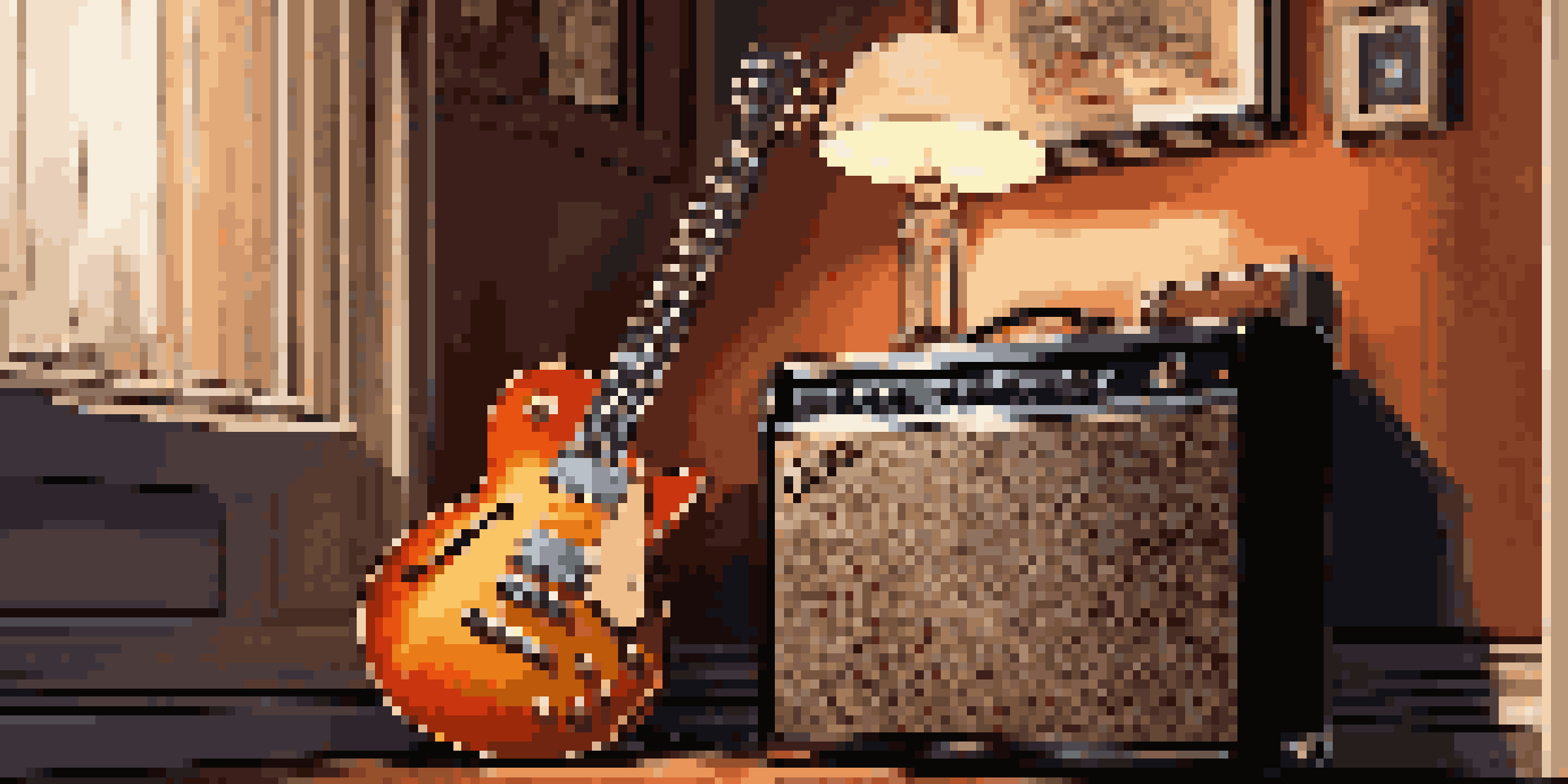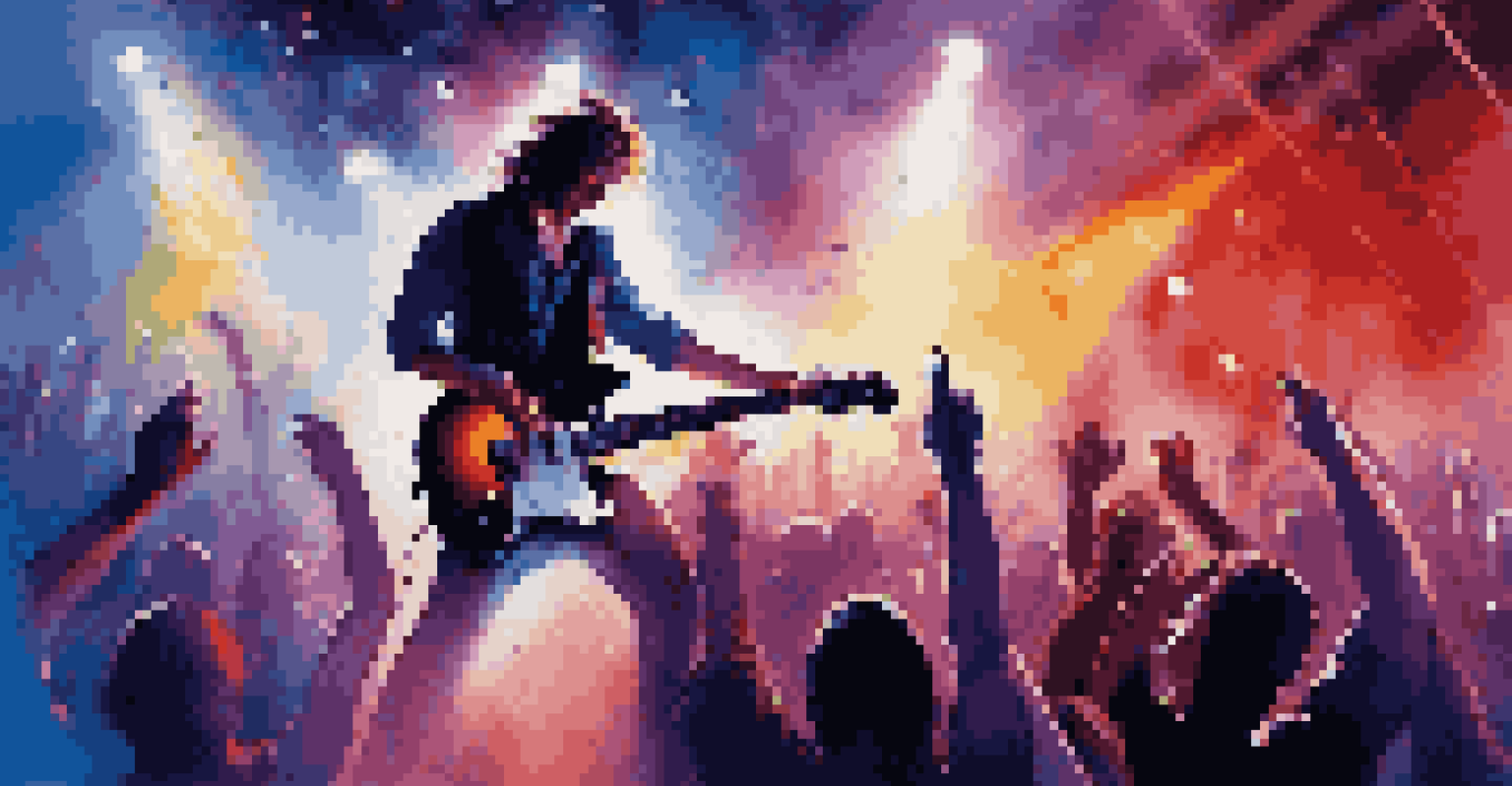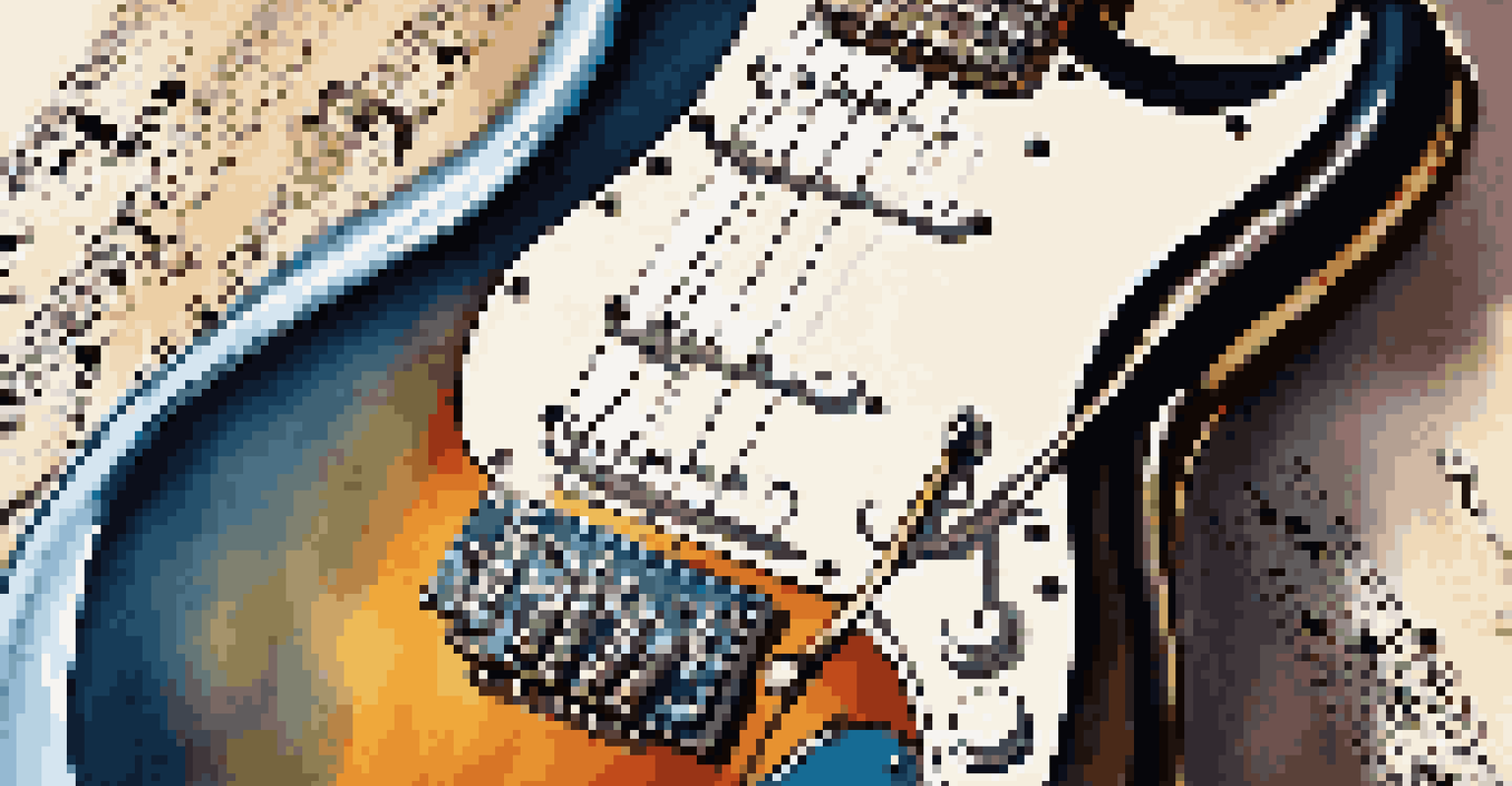The Electric Guitar: Shaping Modern Music Genres

The Birth of the Electric Guitar: A Game Changer
The electric guitar emerged in the 1930s, revolutionizing how music was created and performed. By amplifying the sound of the guitar, it allowed musicians to play in larger venues without losing their voice. This innovation not only enhanced the instrument's volume but also opened the door for new styles and genres to flourish.
The electric guitar is the instrument that has made rock and roll possible. It became the voice of the youth, and it was a reflection of their rebellion against the norms.
Before the electric guitar, acoustic guitars dominated the music scene, limiting the sound and creativity of musicians. With the introduction of electric pickups and amplifiers, artists could explore a broader range of sounds and effects. This shift not only changed how guitarists approached their craft but also influenced song composition across various genres.
As the electric guitar gained popularity, it became a symbol of cultural change in the 20th century. From jazz to rock and roll, its versatility allowed musicians to express themselves in ways that were previously unimaginable, paving the way for countless subgenres.
Electric Guitar and the Birth of Rock and Roll
The electric guitar played a pivotal role in the birth of rock and roll during the 1950s. Artists like Chuck Berry and Elvis Presley harnessed its power to create infectious rhythms and catchy melodies that defined the era. The unmistakable sound of the electric guitar became synonymous with the rebellious spirit of youth culture.

Guitar solos became a staple in rock music, showcasing not just technical skill but also emotional expression. Songs like 'Johnny B. Goode' and 'Hound Dog' highlighted the electric guitar's ability to convey a range of feelings, from joy to angst. This shift in musical focus helped to elevate the guitar from a background instrument to the forefront of popular music.
Electric Guitar Revolutionized Music
The electric guitar transformed music by amplifying sound, enabling new genres and artistic expressions.
The influence of the electric guitar in rock and roll also paved the way for future genres, such as punk and heavy metal. These styles further pushed the boundaries of guitar playing, leading to innovative techniques that continue to inspire musicians today.
Jazz and the Electric Guitar: A Unique Fusion
While rock and roll may be the first genre that comes to mind when thinking of the electric guitar, jazz musicians quickly adopted it as well. Artists like Wes Montgomery and George Benson integrated the electric guitar into jazz, blending traditional elements with modern sounds. This fusion created a new, vibrant style that expanded the possibilities of jazz music.
The electric guitar is like a paintbrush for a musician, allowing for creativity that transcends the boundaries of traditional sound.
The electric guitar allowed jazz musicians to explore new sonic landscapes, incorporating effects like distortion and reverb. This experimentation led to innovative playing techniques, such as fingerstyle and harmonics, that added depth to jazz compositions. The guitar became a prominent voice within jazz ensembles, showcasing its versatility.
As jazz evolved, so did the role of the electric guitar. It became an essential tool for improvisation, allowing musicians to express themselves freely. This shift not only influenced countless jazz guitarists but also inspired musicians across various genres to experiment with their sound.
The Electric Guitar in Blues: A Timeless Connection
Blues music has a rich history that heavily features the electric guitar, with artists like B.B. King and Muddy Waters leading the charge. The guitar's ability to convey emotion perfectly complements the storytelling aspect of blues, allowing musicians to express their feelings of struggle and triumph. The electric guitar's distinct sound became a key element of the genre.
Techniques such as bending strings and using slide guitar became signature traits of blues guitarists, showcasing their unique styles. The emotional depth found in blues music resonates with audiences, creating a strong connection between the artist and the listener. This relationship is often highlighted through powerful guitar solos that evoke raw feelings.
Key Role in Rock and Blues
The electric guitar became a defining instrument in rock and blues, enhancing emotional expression and musical complexity.
The blues laid the foundation for many modern genres, including rock, jazz, and even hip-hop. The electric guitar's role in blues not only shaped its development but also influenced countless musicians across various styles, ensuring its legacy endures.
Country Music and the Rise of the Electric Guitar
Country music may have its roots in acoustic instruments, but the electric guitar has carved out its own niche within the genre. Pioneers like Chet Atkins and Brad Paisley showcased how the electric guitar could blend seamlessly with traditional country sounds, creating a unique fusion. This evolution has allowed country music to reach new audiences while retaining its core identity.
Electric guitars introduced a new level of sophistication to country music, incorporating techniques like chicken picking and twangy riffs. These elements not only enhanced the musicality of songs but also added a modern flair that appealed to younger generations. The electric guitar became an essential part of a country musician's toolkit, shaping the genre's sound.
Today, artists continue to push the boundaries of country music, integrating electric guitar into various subgenres, from country rock to pop-infused styles. This adaptability ensures that the electric guitar remains a vital force in the ongoing evolution of country music.
The Electric Guitar's Role in Pop Music
In the realm of pop music, the electric guitar has proven to be an invaluable asset, providing catchy hooks and memorable riffs. Artists from Madonna to Taylor Swift have incorporated electric guitar elements into their songs, enhancing their appeal and accessibility. The instrument's versatility allows it to fit seamlessly into various pop styles.
The rise of electronic music also brought about a new wave of electric guitar usage, where artists blend traditional guitar sounds with synthesized elements. This fusion creates a fresh and dynamic sound that resonates with contemporary audiences. The electric guitar's ability to adapt to different genres has solidified its place in modern pop music.
Future Adaptability and Innovation
As technology evolves, the electric guitar continues to adapt and inspire new genres and musical creativity.
Moreover, guitar-driven pop anthems have the power to evoke strong emotions and connect with listeners on a personal level. From soaring solos to simple chord progressions, the electric guitar continues to play a significant role in shaping the soundscapes of today's most popular songs.
The Future of the Electric Guitar in Music
As technology continues to advance, the electric guitar remains at the forefront of innovation in music. With the rise of digital audio workstations and software plugins, musicians can create and manipulate guitar sounds like never before. This evolution opens up new possibilities for composition and experimentation.
Emerging genres, such as synthwave and trap, have also begun to incorporate electric guitar elements, showcasing its adaptability. As artists blend styles and push creative boundaries, the electric guitar will undoubtedly continue to evolve alongside them. Its rich history and versatility ensure that it will always find a place in modern music.

Ultimately, the electric guitar's legacy is one of creativity and expression. As new generations of musicians discover its potential, we can expect to see it shape the future of music in ways we can only imagine, continuing to inspire and connect people across the globe.